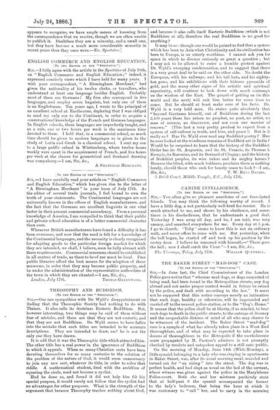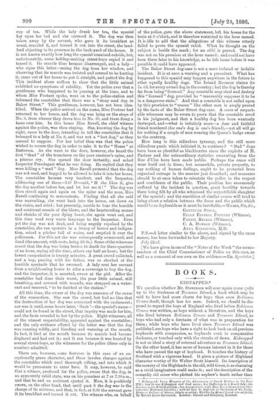THE BAKER STREET " MAD-DOG " CASE.
[To THE EDITOR OF THE " SPECTATOR.'•1 SIR,—In June last, the Chief Commissioner of the London Police gave notice that " whereas mad dogs, or dogs suspected of being mad, had been found in the Metropolitan streets, any dog abroad and not under proper control would in future be seized by the police, and dealt with according to the law." It must not be supposed that this notice conveys merely an intimation that such dogs, healthy or otherwise, will be impounded and carried off to the nearest police-station, or to the "Dog's Home." It means that the police shall be at liberty, if so minded, to beat such dogs to death in the public streets, to the outrage of decency and the unspeakable distress of mind of all who may chance to be witnesses of the incident. The Baker Street "mad-dog" case is a sample of what has already taken place in a West End thoroughfare, and of what may be expected to take place in dozens of thoroughfares in the Metropolis if the unwholesome scare propagated by M. Pasteur's admirers is not promptly checked by resolute and outspoken appeal to a still sane public.
On the morning of Monday, June 14th (Whit-Monday), a little spaniel, belonging to a lady who was staying in apartments in Baker Street, was, after its usual morning meal, muzzled and turned out for " an airing " into the street. The dog was in perfect health, and had slept as usual on the bed of the servant, whose witness was given against the police in the Marylebone Police-court. Both she and her mistress positively state that at half-past 8 the spaniel accompanied the former to the lady's bedroom, that being the hour at which it was customary to " call " her, and to carry in the morning
cup of tea. While the lady drank her tea, the spaniel lay upon her bed and she caressed it. The dog was then taken away by the servant, who gave it its breakfast as usual, muzzled it, and turned it out into the street, the land- lord objecting to its presence in the back-yard of the house. It is not known exactly how long the spaniel remained outside, but, unfortunately, some holiday-making street-boys espied it and teased it. Its muzzle thus became disarranged, and a lady— who signs this letter—seeing the dog from her window, and observing that its muzzle was twisted and seemed to be hurting it, came out of her house to put it straight, and patted the dog. This incident alone suffices to show that the little animal exhibited no symptoms of rabidity. Yet the police aver that a gentleman who happened to be passing at the time, and to whom Miss Footner spoke, went on to the police-station and informed the constables that there was a "stray mad dog in Baker Street." This gentleman, however, has not been iden- tified. When the police arrived on the scene, Miss Footner had returned to her house, and the dog was lying on the steps of No. 9, from whence they drove him to No. 49, and there flung a lasso over him. In this house Miss Revell, the chief witness against the police, was then staying. She, knowing the dog by sight, came to the door, intending to tell the constables that it belonged to a lady at No. 8, and was not a " lost dog," as they seemed to suppose. For her belief then was that the police wished to secure the dog in order to take it to the " Home " at Battersea. As she went to the door, however, she heard the first " thud " of the truncheon on the poor creature's spine, and a piteous cry. She opened the door instantly, and asked Inspector Prendegast what he was doing. He replied that they were killing a " mad " dog. Miss Revell protested that the dog was not mad, and begged to be allowed to take it into her house. The constables became very insolent, and the Inspector, addressing one of them-149 D—said, " If she likes it, give the dog another before her, and let her see it ! " The dog was then struck again and again on the spine and the nose, Miss Revell continuing to remonstrate. Finding that all she said was unavailing, she went back into the house, sat down on the stairs, and cried ; but presently, unable to bear the horrible and continual sounds of the blows, and the heartrending moans and shrieks of the poor dying beast, she again went out, and this time used very warm language to the Inspector. Even yet the dog was not dead, and being angrily repulsed by the constables, she ran upstairs in a frenzy of horror and indigna- tion, seized a pitcher full of water, and emptied it over the policemen. For this act she was subsequently summoned, and fined (the amount, with costs, being £8 8s.) Some of the witnesses assert that the dog was being beaten to death for three-quarters of an hour, crying all the time, others say half an hour ; but the lowest computation is twenty minutes. A great crowd collected, and a boy, passing with his father, was so shocked at the horrible spectacle that he swooned. A lady sent her servant from a neighbouring house to offer a sovereign to buy the dog, and the Inspector, it is asserted, swore at the girl. After the constables had done their worst, the poor little animal, still breathing, and covered with wounds, was strapped on a water- cart and removed, " to be finished at the station."
All this time, the owner of the dog was unaware of the cause of the commotion. She saw the crowd, but had no idea that the destruction of her dog was concerned with the excitement; nor was it until, some hours later, ' Dash '—the spaniel's name— could not be found in the street, that inquiry was made for him, and the facts revealed to her by the police. Eight witnesses, all of the utmost respectability, appeared against the constables ; and the only evidence offered by the latter was that the dog was running wildly, and bleeding and watering at the month. In fact, it bled at the mouth because its muzzle bad become displaced and had cat it; and it ran because it was hunted by several street-boys, as the witnesses for the police (three only in number) admitted.
There are, however, some features in this case of an ex- ceptionally grave character, and these involve charges against the constables which need thorough sifting, and into which it would be premature to enter here. It may, however, be said that a witness, produced for the police, swore that the dog, in an apparently rabid state, was on his premises at 7 or 7.30a.m., and that he and an assistant ejected it. Now, it is positively sworn, on the other hand, that until past 8 the dog was in the charge of its mistress, and that, in fact, at 8.30 the servant gave it its breakfast and turned it out. The witness who, on behalf
of the police, gave the above statement, left his house for the train at 8 o'clock, and.is therefore restricted to the hour named. It is idle to add that the allegations of this witness utterly failed to prove the spaniel rabid. What he thought on the subject is beside the mark ; for an alibi is proved. The dog was not on his premises at the hour named; and could not have been there later to his knowledge, as he left home before it was possible it could have appeared.
The Baker Street dog-case is not a mere isolated or isolable incident. It is at once a warning and a precedent. What has happened to this spaniel may happen anywhere in the future to other equally healthy dogs. The Inland Revenue claims its 7s. 6d. for every owned dog in the country ; but the dog is thereby far from being " licensed." Any constable may steal and destroy this " licensed " dog, provided he "reasonably supposes it to be in a dangerous state." And that a constable is not called upon by this provision to "reason" like other men is amply proved by the facts of the Baker Street dog-case. A score of respect- able witnesses may be sworn to prove that the constable erred in his judgment, and that a healthy dog has been wantonly destroyed, and—what is infinitely more—a dear and faithful friend murdered (for one's dog is one's friend),—yet all will go for nothing if a couple of men wearing the Queen's badge swear to the contrary, How long is this ridiculous tyranny, and the still more ridiculous panic which initiated it, to continue ? " Mad " dogs have been as plentiful as blackberries since the exploits of M. Pasteur and the extraordihary statistics emanating from the Rue d'Ulm have been made public. Perhaps the craze will wear itself out in time ; but meanwhile, private property, to say nothing of human feelings, ought to be protected from organised outrage in the manner just described; and measures should be at once taken to reinstate the police in the respect and confidence of the public. Their position has enormously suffered by the incident in question, great hostility towards them being felt by all who witnessed the unjustifiable slaughter of the spaniel ; and the repetition of similar scenes will tend to bring about a relation between the force and the public which would be as deplorable as it must be inevitable.—We are, Sir, &c., GERTRUDE STOCK, ELLEN ELFRIDA FOOTNER (Witness), FANNIE REVELL (Witness), C. A. DAWSON (Witness), ANNA KINGSFORD, M.D.
P.S.—A letter similar to the above, and signed by the same names, has been forwarded to her Majesty.
July 22nd.
[We have given in one of the " Notes of the Week " the memo- randum of the Chief Commissioner of Police on this case, as well as a comment of our own on the evidence.En. Spectator.]



































 Previous page
Previous page